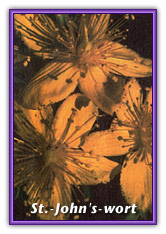 Source
Source
St.-John's-wort is the dried herb or flowering top of a member of the St.-John's-wort family, native to Europe and naturalized in Asia, Africa, North America, South America, and Australia. In 1793 the first recorded specimen in the United States was collected in Pennsylvania. Commercial supplies come from plants cultivated and wildharvested in Chile, the United States, and Europe.
Traditional Use
St.-John's-wort has interested herbalists since the first-century Greek physicians Galen and Dioscorides recommended it as a diuretic, wound-healing herb, and treatment for menstrual disorders. During the Middle Ages, remarkable, even mystical properties were attributed to it - St.-John's-wort was thought to be best if harvested on St. John's Day (June 24). In nineteenthcentury America, it was used by physicians for wound healing, especially for lacerations involving damaged nerves, and as a diuretic, astringent, and mild sedative.
Current Status
Eighteen double-blind clinical trials in humans indicate that standardized St.-John'swort preparations are safe and effective in the treatment of depression and have far fewer side effects than conventional drugs. A recent clinical trial confirmed the results of previously reported studies. In a randomized placebo-controlled double-blind study of 105 outpatients diagnosed with mild to moderate depression or temporary depressive moods, patients were given the equivalent of 300 mg of St.-John's-wort extract (standardized to a hypericin content of 0.9 mg) or a placebo daily for four weeks. In the treatment group, 67 percent improved, but only 28 percent of the placebo group responded. Patients who took the extract felt significant improvement in depressive mood indicators such as feelings of sadness, hopelessness, helplessness, and uselessness, as well as fear and difficult or disturbed sleep. No significant side effects were observed. Researchers concluded that St.-John's-wort extract, compared with synthetic antidepressants, produced side effects of minor significance and can be recommended for the treatment of mild and moderate depression. Externally, St.-John's-wort oil is used for the treatment of wounds, abrasions, and firstdegree burns.
Preparations
The dried herb and flowering tops may be made into tea or soaked in olive oil (imparting a red pigment, hypericin, to the oil) and used for external applications. Products standardized to contain 0.2 to 0.3 percent hypericin are now available. Capsules, tablets, tinctures, extracts and other products are also found in the American market.
Cautions
Hypericin from the flowers may cause light-skinned animals that consume the plant to break out in hives or blisters upon exposure to sunlight, a reaction called photodermatitis. If you have fair skin, be aware of this potential problem, especially if you are likely to be exposed to bright sunlight after taking the herb. Clinical studies on St.John's-wort extract's antidepressant activity have not reported this side effect, but in studies using pure hypericin, photodermatitis did occur in humans.
Symptoms
Cuts and abrasions
Actions
Antidepressant

![]()
![]()
![]()
 Source
Source